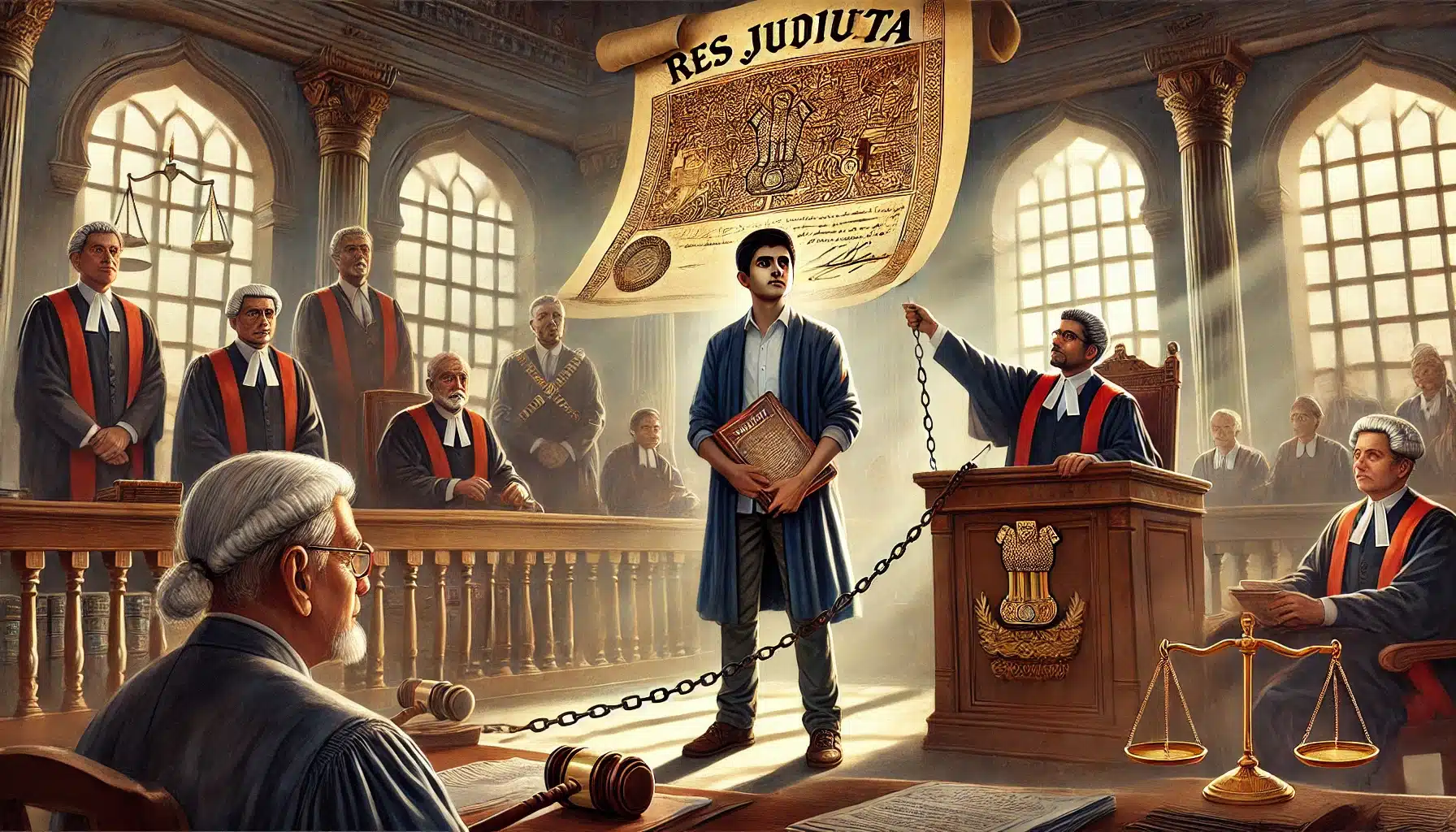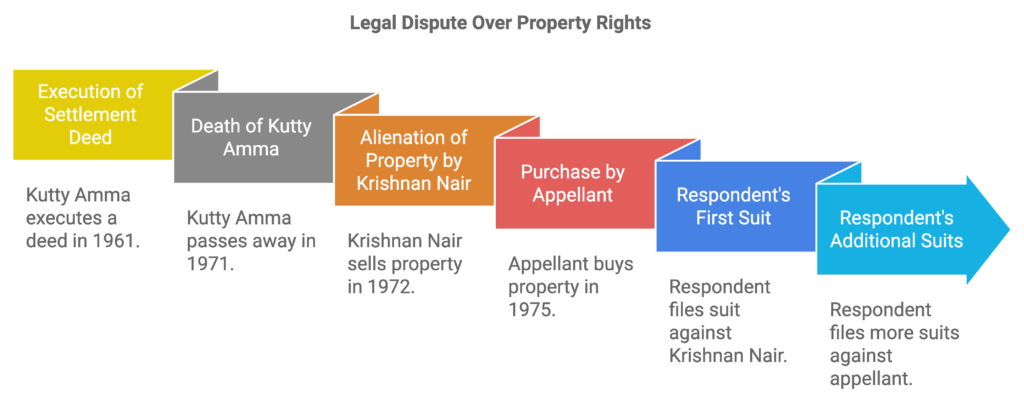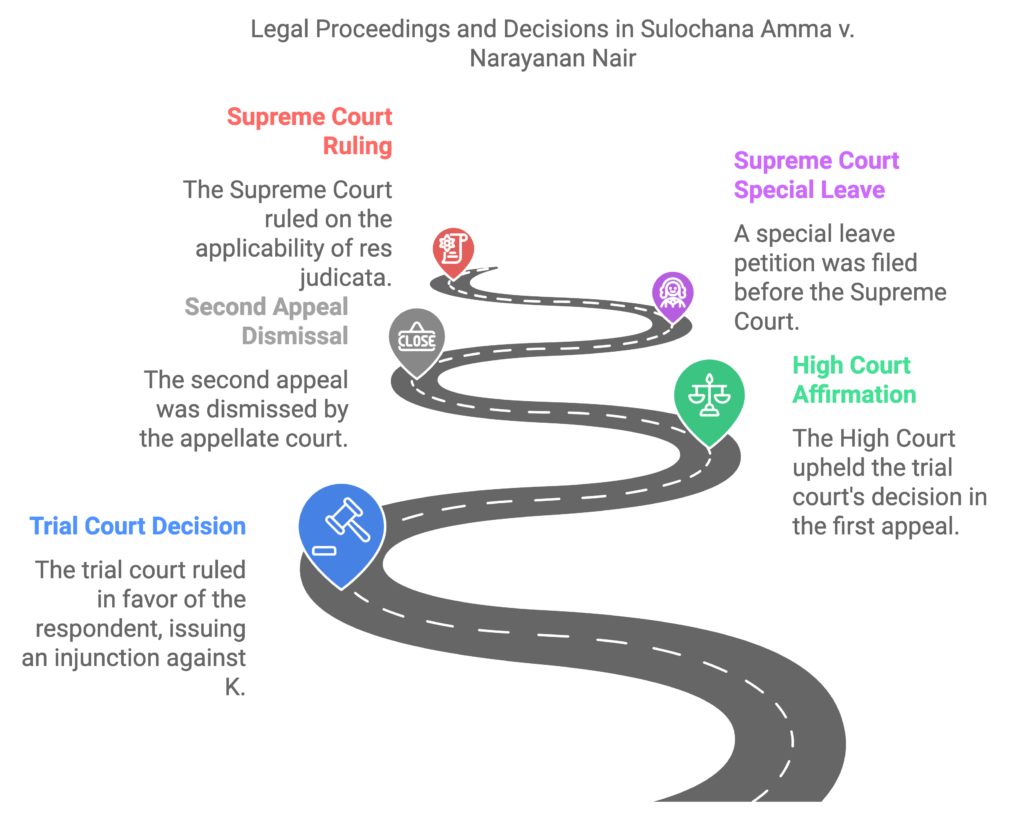In Sulochana Amma v. Narayanan Nair (1994), the Supreme Court upheld the application of res judicata to injunction decrees from courts with limited pecuniary jurisdiction. The case involved property rights and multiple suits following the alienation of a life estate. The Court ruled that once a comp

“Supreme Court Upholds Res Judicata in Injunction Decree: Limited jurisdiction courts’ decisions can be binding”
Hear this case study on a podcast! Happy listening!
Citation: (1994) 2 SCC 14
Date of Judgment: 24th September, 1993
Court: Supreme Court of India
Bench: K. Ramaswamy (J), N.P. Singh (J)
Facts
- The case centered around a dispute over property rights that arose following the death of Kutty Amma, who had executed a settlement deed in 1961. This deed granted a life estate to her husband, Krishnan Nair, while transferring the vested remainder to the respondent.
- Upon Kutty Amma’s death in 1971, Krishnan Nair alienated the property in 1972 through a registered sale deed to two individuals, Narayanan Nair and Chennan. In response, the respondent initiated multiple legal proceedings to protect his rights to the vested remainder.
- The first suit was filed against Krishnan Nair to restrain him from alienating the property and committing waste acts. Despite this, the appellant, who was not a party to the original suit, purchased the property from Narayanan Nair and Chennan in 1975.
- The respondent then filed additional suits against both Krishnan Nair and the appellant to prevent waste and later sought a formal declaration of his title and possession of the property.

Decision of the trial court
The trial court decreed the suit in favor of the respondent, holding that K had no right to alienate the lands, and issued a permanent injunction restraining him from committing acts of waste. The trial court also granted mesne profits to the respondent.
Decision of the High Court
The appellate court reiterated the findings of the trial court in the first appeal. Subsequently, the second appeal was dismissed. Owing to the dismissal of the second appeal, the special leave was filed before the Supreme Court.
Decision of the Supreme Court
The Supreme Court ruled that Explanation VIII to Section 11 of the Code of Civil Procedure should be interpreted harmoniously with Section 11 itself. This means that decrees of courts with limited pecuniary jurisdiction can be considered final (res judicata) in subsequent suits between the same parties if the issue was directly and substantially decided in the earlier case. The court also clarified that this applies to injunction decrees where the issue of property ownership is central. This prevents unnecessary relitigating and ensures finality in judicial decisions.
Key legal issues discussed
1. Whether Explanation VIII of Section 11 of the Code of Civil Procedure be applicable to the bar of Res Judicata?
Yes
The court emphasized the importance of Explanation VIII attached to Section 11 of the Code of Civil Procedure (hereinafter referred to as C.P.C.). The apex court observed the interpretation of Explanation VIII made in earlier judgments. As per the court, the phrase “competent to try such subsequent suit” requires that the court’s pecuniary jurisdiction at the time of the initial suit must extend to the subject matter of any potential future litigation between the same parties or their privies arising from the same cause of action. Mere competence to adjudicate the specific issue raised in the subsequent suit is insufficient. A prior decree will only operate as res judicata if the court that rendered it had jurisdiction to hear and decide not only the original suit but also any related subsequent proceedings.
The court stated that Explanation VIII should not be treated as an exception to Section 11; rather, it should be given a harmonious construction. In the 6th para of the judgment, the court remarked, “Section 11 is to be read in combination and harmony with Explanation VIII. The result that would flow is that an order or an issue which had arisen directly and substantially between the parties or their privies and decided finally by a competent court or tribunal, though of limited or special jurisdiction, which includes pecuniary jurisdiction, will operate as res judicata in a subsequent suit or proceeding, notwithstanding the fact that such court of limited or special jurisdiction was not a competent court to try the subsequent suit. The issue must directly and substantially arise in a later suit between the same parties or their privies.”
The court explained the policy behind the harmonious construction that if Explanation VIII were not interpreted broadly, litigants could engage in vexatious litigation by strategically filing successive suits in courts of limited pecuniary jurisdiction and then in courts of higher jurisdiction, repeatedly relitigating the same issue. This would lead to conflicting decisions and prolong the dispute unnecessarily. The non-obstante clause in Explanation VIII indicates a clear legislative intent to attach finality to decrees of civil courts of limited pecuniary jurisdiction, thereby preventing such dilatory tactics and ensuring that issues are conclusively resolved in a single proceeding between the same parties or their privies.
2. Whether the doctrine of res judicata will apply in cases of injunction decrees granted by a court of limited pecuniary jurisdiction?
Yes
The Supreme Court observed that the doctrine of res judicata would apply to injunction decrees granted by a court of limited pecuniary jurisdiction when the issue of title is directly and substantially in issue. This interpretation aligns with the established principle that when the ownership or validity of property is central to an injunction suit, the decree can operate as res judicata in subsequent proceedings involving the same parties or their successors in title.
The court’s reasoning is grounded in the understanding that the validity of title is a fundamental issue that is directly and substantially addressed in an injunction suit seeking to protect property rights. Therefore, a final determination of title in such a suit precludes the parties from relitigating the same issue in subsequent proceedings. In the 9th para of the judgment, the court determined that “Therefore, even the decree founded on equitable relief in which the issue was directly and substantially in issue and decided, and attained finality, would operate as res judicata in a subsequent suit based on title where the same issue directly and substantially arises between the parties. As the appellant is deriving title from K who was a party in the former suit is also hit by the doctrine of lis pendens under Section 52 of the Transfer of Property Act.”



